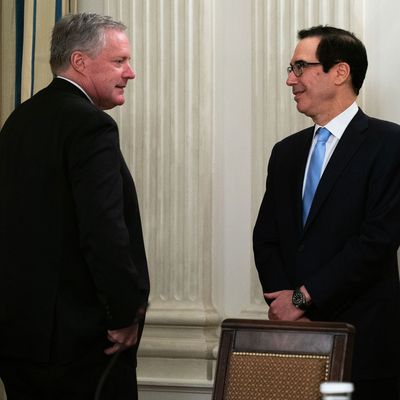
Ask any congressional Democrat and you’ll hear that the big mess surrounding COVID-19 stimulus negotiations is the result of Republican procrastination. House Democrats passed their proposal, after all, in mid-May. Yet here we are in late July, with key CARES Act provisions expiring and a month-long congressional recess looming, and the ink is barely dry on a GOP proposal that half their Senate conference seems to oppose and that President Trump is undercutting with his own priorities.
According to all accounts, initial talks involving White House negotiators Steven Mnuchin and Mark Meadows (who may not be entirely in sync with each other) and Democrats Nancy Pelosi and Chuck Schumer are off to a horrible start, with zero progress being made. Here’s how the Washington Post described the situation:
A meeting between top White House officials and Democratic leaders ended with no agreement on extending emergency unemployment benefits that expire Friday or on reviving a moratorium on evictions that lapsed last week. That means some 20 million jobless Americans will lose $600 weekly enhanced unemployment benefits that Congress approved in March, which could send the economy reeling.
After a day of meetings, all parties declared their differences all but irreconcilable. Democrats shot down the idea of a short-term fix for unemployment insurance and the eviction moratorium, which President Trump had announced earlier Wednesday he would support. And the two parties remained far apart on a larger bill, with Democrats standing by their wide-ranging $3 trillion proposal even as Republicans struggled to coalesce around a $1 trillion bill released by Majority Leader Mitch McConnell (R-Ky.) on Monday.
This doesn’t seem to be the usual partisan posturing before real negotiations begin, but rather a genuine game of chicken. The important thing to understand is noted by Politico:
AT THE MOMENT, THE DYNAMIC IS THIS: PELOSI and Senate Minority Leader CHUCK SCHUMER hold all the cards, mostly because they’re the only ones who have passed a bill and Republicans, as Senate Majority Leader MITCH MCCONNELL put it, are all over the lot. MEADOWS and STEVEN MNUCHIN are fighting for a president who doesn’t mind big spending, but the WH chief of staff and Treasury secretary have to contend with the reality of divided government, and a Senate GOP Conference split in about 30 directions.
More to the immediate point, there are enough Republican senators determined to oppose any stimulus measure that nothing can get out of that chamber without significant Democratic support. That means Republicans are going to have to give a lot more than they get to obtain a full deal, particularly if you understand that Trump and the GOP need to get some money flowing lest a flagging economy entirely doom their November prospects.
Clearly the White House would like to cut a stopgap deal preventing federal UI supplemental benefits from running out altogether (the last payments went out last week) and extending a moratorium on evictions in federally assisted rental housing (benefiting roughly a third of U.S. renters) that expired on July 25 — an item Trump himself injected into the discussion after the announced Republican proposal omitted it altogether.
But Pelosi and Schumer had emphatically rejected the idea of a short-term deal that reduces the leverage they have over a larger package. So far Republican talk of a compromise on UI has been combined with demands that that the existing $600 per week federal supplemental benefit (which Democrats want to extend to the end of the year) be slashed to $200 or less. It is possible a full Republican cave on UI and rental-eviction relief might convince Democrats to agree to a stopgap measure, giving Congress and the White House more time to work on a bigger deal, but it’s doubtful Trump and McConnell would be willing to accept so humiliating a surrender, which would further feed the revolt of neo-fiscal-disciplinarians like Ted Cruz and Rand Paul.
In terms of a larger deal, there are some building blocks the two sides could utilize to move ahead. They are in near agreement on the size and structure of a second round of $1,200 stimulus checks (the Democratic bill has larger payments for dependent children, but otherwise the proposals are the same). They also agree in principle on new funding for the small-business Paycheck Protection Act, for COVID-19 testing and equipment, and for schools (though they are miles apart on conditions and eligibility for K-12 assistance).
But there’s little or no agreement on areas that each side has identified as must-have: Democratic proposals for massive new fiscal assistance to states and localities and Republican proposals to shield businesses and other institutions from lawsuits related to poor handling of the pandemic. Republicans have repeatedly denounced state and local aid as a bailout of profligate governments, while Democrats have attacked the liability shield as corporate welfare at the expense of workers forced to risk exposure to COVID-19.
And there are a thousand little irritants in the mix, most notably Trump’s insistence that any deal include money to build the FBI a new headquarters near his own downtown Washington hotel.
Assuming talks drag on into next week, the July jobs report due out on August 7 could have an impact on the perceived urgency of new stimulus measures. For now, though, it’s Republicans who must try to get their act together and end the impression that they can’t be trusted to execute a deal even if they struck one.






























